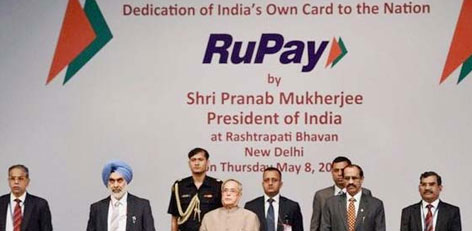Card Payment Network RuPay Sees Boost From Government Banking Scheme
Mumbai:
A government drive to expand banking services in India is giving a boost to home-grown card payment network RuPay, which expects to quadruple the number of users by March and make debit cards more acceptable in a nation where cash is still king.
Started in 2012 by a company owned by 10 local and foreign banks, RuPay competes with global payment firms Visa Inc and MasterCard Inc for the few customers in Asia’s third largest economy able to afford a debit or credit card.
As of July, banks issued just under 435 million payment cards in India, a nation of 1.3 billion people. Most were debit cards.
RuPay’s share of daily card transactions, however, remains small compared to the global firms, which are more established, offer both debit and credit cards and are accepted by more retailers. RuPay currently offers only debit cards.
RuPay users account for just 1.5 per cent of daily card transactions of almost one million at retailers, said A.P. Hota, chief executive of the National Payments Corp of India (NPCI), which runs RuPay.
Hota told Reuters the payments network was set to grow rapidly from the government’s so-called financial inclusion scheme, which aims to ensure the majority of households has a bank account within months.
Under the scheme launched late in August, Indians who open a bank account for the first time automatically get a RuPay card.
Hota said the number of RuPay users has now almost doubled from 23 million at the end of July.
By March next year, he expects that number to rise to 160 million, with more than 60 per cent of the increase coming from the government scheme.
“Jan Dhan itself would provide a big opportunity for the domestic card brand to be a formidable force,” said Hota, referring to the financial inclusion scheme, Jan Dhan Yojana, which means People’s Wealth Scheme.
“(RuPay Card transactions are) just a drop in the ocean at the moment. But drop by drop we are increasing our size.”
NPCI is also trying to lure more customers by charging banks lower fees than Visa and MasterCard, Hota added.
Visa and MasterCard did not reply to Reuters’ requests seeking comment.
NPCI’s shareholders include India’s biggest bank, the State Bank of India, and foreign lenders Citibank and HSBC. The Reserve Bank of India bank has a nominee on its board.
The organisation plans to launch RuPay cards that will be accepted overseas through a partnership with Discover Financial Services, Hota said, and is also in talks with Japanese card network JCB about a partnership.
RuPay had aimed to issue credit cards by March 2015, but those plans have now been delayed by the government scheme, Hota said. “Rural acceptance of the Jan Dhan cards will be our priority,” he added.
Copyright: Thomson Reuters 2014






